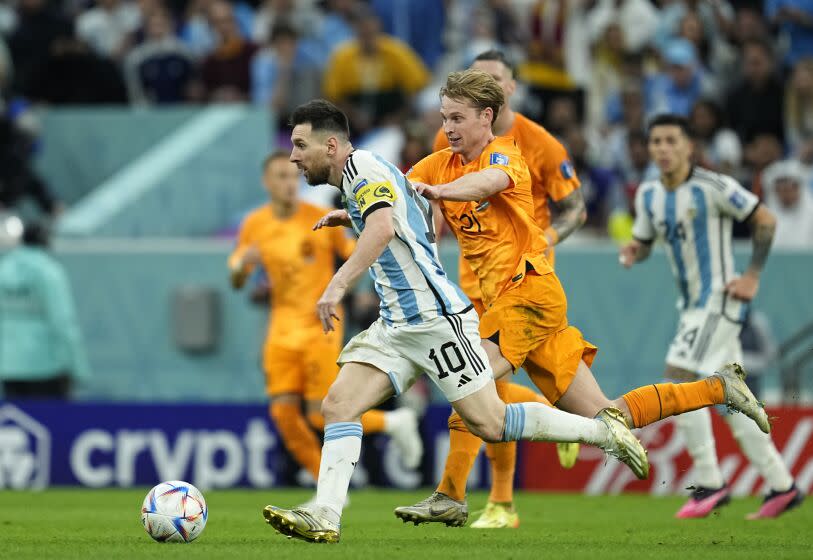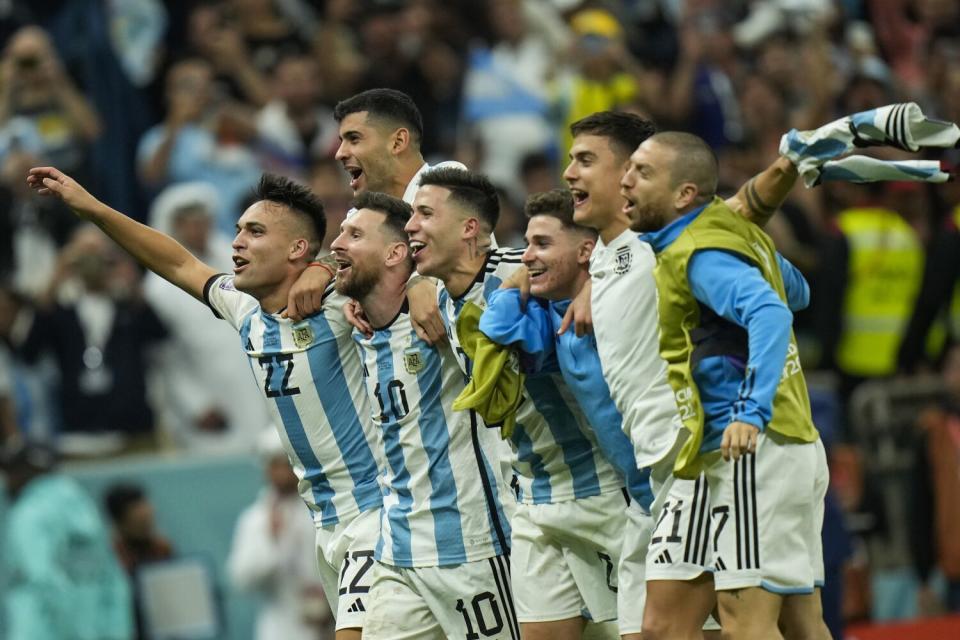Lionel Messi, Argentina beat Netherlands on penalty kicks, reach World Cup semifinals

There’s only one major prize missing from Lionel Messi’s trophy case — a World Cup.
He has won everything else there is to win, done everything else there is to do. But if he’s to retire as the greatest player of his generation, he needs to win soccer's biggest prize.
Diego Maradona, the player to whom Messi is most often compared, won fewer titles and scored fewer goals. But he won a World Cup, which is why there’s a religion in Argentina named after him while Messi doesn’t even have his own church.
Messi, however, still has a prayer of matching Maradona after willing Argentina into the semifinals of the Qatar World Cup on Friday by leading his team to a 4-3 penalty-kicks victory over the Netherlands after the teams had played to a 2-2 tie during 90 minutes of regulation and two 15-minute extra time periods. And he has largely carried Argentina there himself, scoring or assisting on six of the team's nine goals, including playing a role in both scores Friday.
He then set the tone for the five-round, tiebreaking shootout by burying the first shot for Argentina. Goalkeeper Emiliano Martínez stopped the first two Dutch tries. So when Lautaro Martínez, the fifth shooter, put his shot into the back of the net, Argentina was on to the semifinals and a meeting with Croatia, which eliminated Brazil on penalty kicks in Tuesday’s other semifinal.
“When we won, it was a huge weight off our shoulders," Messi said. “We suffered, [but] we got to the semifinal. That is what we wanted.”
It’s the fourth time Argentina has advanced to a World Cup semifinal. On the three previous occasions, it reached the final, which is where coach Lionel Scaloni said his team was headed this time as well.
“Our objective is to play all seven games,” he said. “Now that we are dancing, we need to keep on dancing. We want to take the next step.”
The only other time Messi got this far in a World Cup was in 2014, when Argentina lost to Germany in extra time in the final. And though he won the Golden Ball as the most valuable player in that tournament, it was a prize he cradled dejectedly as Germany’s players accepted their winners’ medals.
That’s clearly not an experience he wants to repeat.
He helped Argentina to a 1-0 lead Friday, drawing defenders to him on a long, broken-field run that ended with a perfect through ball to Nahuel Molina, who beat Dutch keeper Andries Noppert with a shot into the far corner in the 35th minute. It was Molina’s first international goal in his 25th game.
Messi doubled the lead on his own midway through the second half, converting a penalty kick that was awarded after Dutch winger Denzel Dumfries tripped Argentina defender Marcos Acuña on the left edge of the box. The goal was Messi’s 10th in World Cup play, two more than Maradona.
But Argentina couldn’t close it out, with Wout Weghorst scoring on the Netherlands’ only two shots on goal, the first a header in the 83rd minute and the second coming deep in stoppage time, with Teun Koopmeiners rolling a free kick from just outside the box to the side of the Argentine wall for Weghorst, who took a touch before slotting a shot past a surprised Martínez into the bottom left corner.
The goals made Weghorst, who came on in the 78th minute, the first Dutch player to score a World Cup brace off the bench. More important, they sent the game to extra time, the fourth knockout game in this tournament to extend beyond 90 minutes. And though Argentina had the best chances — really the only chances — in the two additional periods, the 30 minutes resulted in a 2-2 tie after Enzo Fernández sent a right-footed shot off the left post at the whistle, ending a World Cup match that produced a tournament-record 17 yellow cards.

History was on Argentina’s side in the tiebreaker because its five wins on penalties are the most in World Cup history while only Spain has lost more often than the Netherlands in a shootout. Scaloni said his players seized the moment again.
“Sometimes it is difficult in these situations and people shy away,” he said. “This time, we had too many volunteers. It is something very positive when you see the whole team wanting to take a penalty.
“And then we had Emiliano. We knew he could save some penalties.”
That last fact might have surprised Netherlands coach Louis van Gaal, who is unbeaten in 12 World Cup games. While two of those draws ended in penalty-kicks losses to Argentina, he was confident Friday — a fact Martínez, the Argentine keeper, was told about.
“I heard Van Gaal say, ‘We’ve got an advantage in penalties. If we go to penalties, we win,' ” Martínez said. “I think he needs to keep his mouth shut.”
He won’t be saying more in Qatar. After the loss, he confirmed he was stepping down from the Dutch national team. Messi and Argentina, however, are going on together. After Lautaro Martínez made the penalty kick that finally decided matters, Messi — with his arms outstretched — leaped into the arms of his goalkeeper.
Messi later said that Maradona, the man whose accomplishments have shadowed him for most of his career, is providing inspiration.
“Diego is watching us from heaven,” Messi said of Maradona, who died two years ago. “He is pushing us. I hope it stays like that until the end.”
He continued: “It was a very hard match form the beginning. We knew it was going to be this way, [but] we really enjoyed that moment.”
He just hopes there are more to come.
This story originally appeared in Los Angeles Times.


